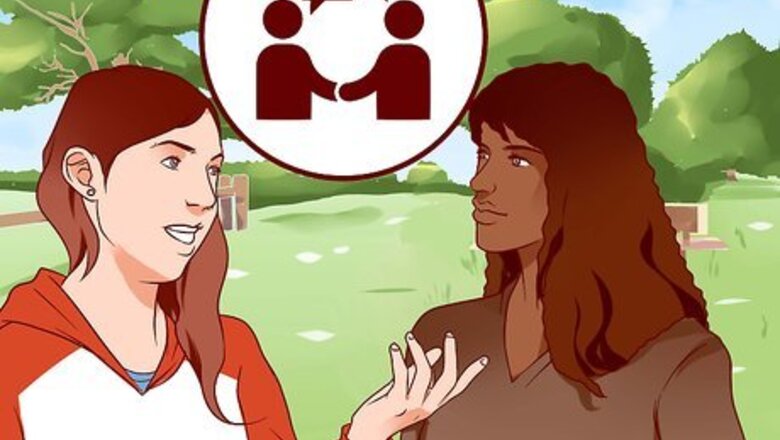
views
X
Research source
Naive people are often so trusting of others around them that their natural innocence results in them getting cheated or hurt. Naiveté isn't always a bad thing; it may help you be more optimistic and entrepreneurial.[2]
X
Research source
Nevertheless, if you want to be less naive, you'll want to open yourself up more to experiences, instead of shying away from them. You also want to take certain precautions in social situations.
Opening Your Eyes to the World
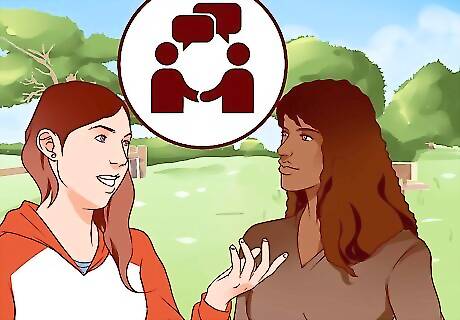
Meet people from different backgrounds. Sometimes, people are perceived as being naive because their worldview is narrow or they have only limited life experience. Getting out and interacting with people who live distinctively separate lives can be a learning experience that helps you understand the world with greater nuance. You might be naive because you grew up well-off and are blind to those less fortunate than you. Having friends from different socioeconomic backgrounds can help you to appreciate how fortunate you are. Individuals who grow up in small towns often are naive to urban lifestyles. Visiting a city and connecting with people who live there can empower you and bring you knowledge about worlds different than your own. Friendships between people from different cultures helps you to develop empathy for all human beings and respect other cultures' beliefs and practices. You could try joining a cultural club in your community or learning a foreign language. If you know people from other cultures and walks of life, ask them questions (politely, of course) about their customs, views, and experiences. You can only learn as much as you're willing to listen.

Engage in novel experiences. Some naive people are that way because they were raised in very sheltered environments. Maybe your parents didn't allow you to go to parties or hang out with other kids your age, so you missed out on certain experiences. Make up for lost time by doing all the exciting activities you can think of to change your perspective of the world and the people in it. Go skydiving, hike/camp through a national park, write a novel, or learn a new language. Novel experiences stimulate new brain cell growth. So, not only are you expanding your behavioral repertoire and collecting stories to tell, but you're also benefiting brain health.

Go beyond your comfort zone. When you have always done things a certain way, it can be challenging to suddenly change the direction of your sails. However, you will never know exactly how talented you are or what you are capable of if you don't break out of the box you've been in. Don't settle for an ordinary life just because you're comfortable. Strive for the extraordinary in all your endeavors. You will become more knowledgeable about the world in the process. Stepping out of your comfort zone may help you to reinvigorate your life and get in touch with a part of yourself that, up until now, lies dormant. Claiming more new and challenging opportunities results in greater productivity, enhanced creativity and satisfaction.

Travel more. Whether it's to the next state over or around the globe, visiting new places makes the world smaller. You instantly shed your "green" skin and become more worldly with travel. Naive individuals may have underdeveloped social skills, making them less likely to get out there. However, by traveling the world, you can acquire social skills and transform the way you view and interact with others locally and globally. Solo travel, for example, boosts your natural instincts and challenges you so that when you return home, making new friends, eating alone in a restaurant, or seeing a movie on your own are all much easier. Flying solo also enhances your confidence and removes the focus of a companion, increasing your chances of meeting new people and participating in new experiences. Just make sure you commit to being open to new experiences. "Culture shock" upon encountering a culture that's different to what you're used to is very real and may be even more significant if you're a fairly naive person. Accept that when you travel, you will encounter experiences and people who are very different and that you may even have times when your experiences make you uncomfortable. That's all part of learning about life in other places.

Volunteer. Just as connecting with others from different backgrounds gives you a new perspective on life, so does helping out those in need. In addition, to helping you stomp out your inexperienced self, your efforts will also solve problems and improve communities. Believe it or not, volunteering is even good for your health. It has positive effects on physical and mental health, including giving people an increased sense of purpose and fulfillment. Consider what you have to offer. Many volunteering opportunities require no special skills, but if you're great with computers or a "people person," you may find opportunities that suit your skills and personality.
Being More Careful Socially
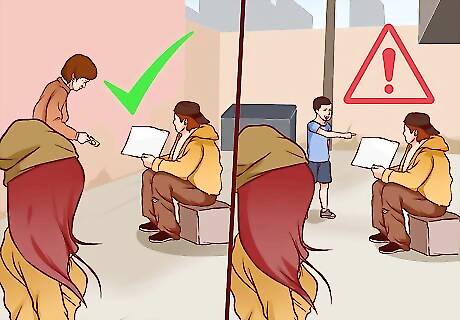
Be more alert. Once you get out there more, you will realize that, no matter where you are, there are both good people and bad people. Be aware of the kind of people around you.

Determine if people are trustworthy. Give people a chance to show you who they are before you put your trust in them. It's okay to enjoy people's company without letting them get too close too fast. If you have a tendency to get too close too fast, bring someone along for initial meetings with new acquaintances so that you can get a second opinion before beginning new friendships or relationships. If someone you've known for a long time suddenly does something hurtful to you, use your previous relationship with them to decide what to do. If they've otherwise been trustworthy and you think they're genuinely sorry, it might be worth giving them a second chance—or, you might decide the relationship is no longer sustainable.

Identify the signs of dishonesty. Meeting someone new can be fresh and exciting, but you need to watch for certain indicators that a person may not have your best interests at heart. Not all liars look away while telling a lie. The most experienced liars can hold eye contact even when being deceitful. Fidgeting may be a sign of dishonesty, especially if it only occurs during specific incidents or stories rather than being a general habit. Other body language that indicates dishonesty includes frequent throat clearing or swallowing, a hand near the base of the neck (such as toying with a necklace), leaning backward, or a lack of "emphatic gestures" such as pointing or head tilting. No one sign is proof that the person is lying, and many of these behaviors could just be a sign of nervousness. However, if you see several of them at once, it may be a sign of dishonesty. Be wary of new people who are extremely interested in you. Individuals trying to learn too much about you too quickly are a red flag, particularly if they are concerned about your personal life, work, or financial situation. These people may have an underlying motivation to be friends with you.
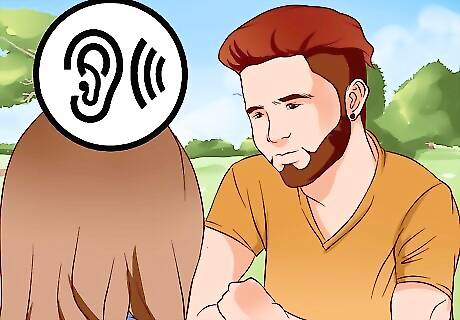
Listen more, talk less. Engage in surface-level conversations until you feel more comfortable with new acquaintances. Listen more to what the other person says rather than sharing so much about yourself. Plus, this kind of behavior with new friends can be a perk since most people enjoy talking about themselves and are often thrilled to have a willing listener. Keep your secrets close to your vest. Naive people often trust strangers too quickly. Don't let anybody know about your personal life and business except for your family and a trusted best friend or partner. Avoid over-sharing. Refrain from talking impulsively. If you are a person who rarely thinks before you speak, take action to avoid saying things you might regret. Pause and ponder your words before speaking.

Learn to read people. What people say and what they feel deep inside are usually two different things. Words make up only 7 percent of our communication. 55 percent is body language and 30 percent is tone of voice. Is your acquaintance leaning away from you versus toward you? This could reveal that this person does not like you. Are your acquaintance's hands tucked under legs, in pockets, or behind the person's back? This could reveal that the person is not interested in the conversation or interaction. Check for questionable body language. An open-arm posture facing you square on is indicative of someone who is comfortable with what's going on. Is your acquaintance grinding teeth or pursing lips? These are indicators that the person may be feeling tension in the current situation. If deep down, you think someone is fishy or dishonest, distance yourself from this person immediately. Learn to trust your instincts.
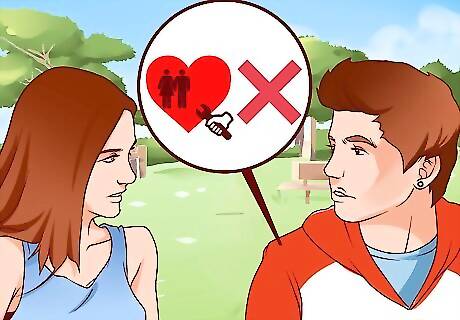
Recognize that you can't "fix" people. Sometimes, people may be called naive if they believe that they can "fix" others by helping them, loving them, believing in them, etc. This is particularly common in romantic relationships. To become less naive, acknowledge that each person is responsible for his or her own behavior and actions. For example, a common sign of an unhealthy romantic relationship is that a person believes that s/he can "love" the other person into giving up unhealthy behaviors or becoming a better person. While you can certainly support your partner, you can't "fix" someone by loving.

Have confidence in yourself. Even if you are naive, you still have something unique to offer the world. In fact, naive people may take more risks and be more productive than more experienced people who are always second-guessing themselves. Learn to accept how you are naturally.

Give yourself time. You will not change from being naive overnight. Allow yourself a period of time to adjust to being more discerning of those around you. Go on a sabbatical from starting any new relationships for a while until you feel more capable of judging the intentions of others.


















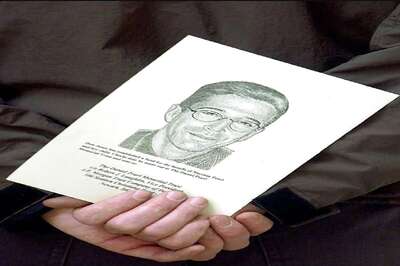

Comments
0 comment